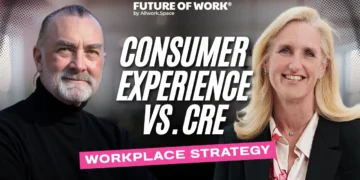Before coworking burst onto the scene, community spirit was more closely associated with campfires, cringe-worthy group icebreakers and Kumbaya. Today however, a positive community has become the Holy Grail of a thriving flexible workspace culture, one that can drive positive client engagement and develop loyalty.
There’s a lot to be said for a welcoming workspace community, but even the best spaces can’t please everyone. Or can they?

The Office Group‘s Community Manager, Alessa McNally, understands that no single approach can meet every requirement. She should know; Alessa oversees community responsibilities at all 28 workspace locations along with the company’s Community Team, whose top task is to create opportunities for members to interact, connect, and feel part of a buzzing workplace.
“You can’t make everyone happy,” says Alessa. “For instance, some people love coming to lots of different events, others don’t.
“So we cover all bases to suit different needs and personalities. We always have something different going on – social events, wellness and fitness classes, business advice seminars, and more. No two days are ever the same!”
Variation is most likely the single approach that can indeed please multiple personalities – that, and an understanding of how to connect with different people within their own comfort zone.
“We find that if a member is quite introverted and doesn’t feel comfortable in large social gatherings, they tend to prefer calm, small-scale events,” says Alessa. “Walking into a place full of new faces can be daunting, so it’s all about making them feel comfortable and taking away any feelings of awkwardness.”
Pizza Parties
A strong, happy and inter-connected community isn’t based on events alone. But according to Alessa, it certainly helps – especially when you already have a large and committed group to work with.
“We’re lucky in that we have a very strong base of 11,000 members. When we have a new team move in we often throw a Pizza Party and invite everyone to come and meet them. It’s a great way to break the ice and people talk about it for ages afterwards.”
A positive workspace culture is powerful stuff. Some would even say it’s a commodity, something that can sell the workspace to potential clients.
But this particular USP can’t be bottled and put on a shelf. So how do you convince clients that what they’re buying into is more valuable than simply a place to work?
“It usually comes as a pleasant surprise,” says Alessa. “When we give tours of our spaces we just act ourselves – we say ‘Hi!’ to people in the corridors, we introduce new members to different people, we show them around and try to make them feel at home. That way we find the community really speaks for itself.
“During tours, people almost always comment on the ‘buzz’ – it’s like a sixth sense. You can’t see it but you know it’s there. Plus all our spaces are very design-led, we have a Property Team who work with architects and designers to create really beautiful spaces with amazing furniture. That’s the first thing people see and it works together with the community.
“You really have to experience and feel it to understand it.”
Company evolution
Unsurprisingly, many workspaces are trying to get hold of this secret sauce.
Some have gone so far as to change the role of their Centre Manager to a Community Manager, to varying degrees of success. A Community Manager is a people-centred position rather than an operational one, and without the right strategy or support – and despite best intentions – the role can quickly fall back into the realms of building management.
For Alessa and the Community Team however, their focus doesn’t just lend itself to a happy client base. It also directly influences the future of The Office Group.
“One of the most important things we do is provide a direct line between our members and the evolution of The Office Group. Because we spend so much time with our members, we receive constant feedback – what they like, what they don’t like, what they’re missing – and we feedback directly.
“That way our members are genuinely shaping the direction of the company and ensuring our future is a positive one that’s relevant to their needs. And that’s exactly how it should be.”















